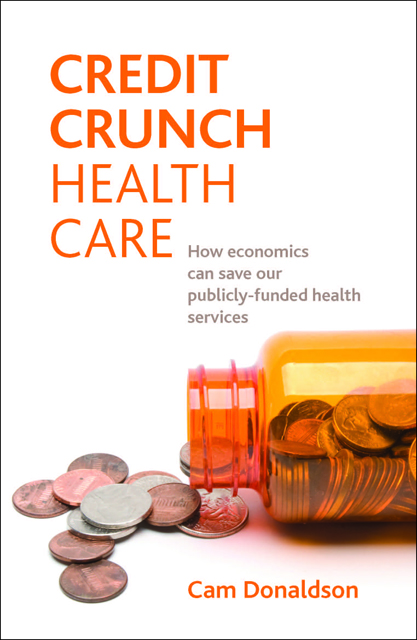Book contents
- Frontmatter
- Dedication
- Contents
- List of figures, tables and boxes
- About the author
- Acknowledgements
- Foreword
- one Introduction: the quid pro quo of health care
- two Market failure and health care
- three Charging the public: exception or anomaly?
- four Reform, privatisation and those damn doctors
- five The fiscal future of health care: an economistâs rant
- six Economic evaluation
- seven Whatâs your health worth?
- eight Conclusion
- Appendix: 'What's your health worth?' A questionnaire
- Index
six - Economic evaluation
Published online by Cambridge University Press: 15 April 2023
- Frontmatter
- Dedication
- Contents
- List of figures, tables and boxes
- About the author
- Acknowledgements
- Foreword
- one Introduction: the quid pro quo of health care
- two Market failure and health care
- three Charging the public: exception or anomaly?
- four Reform, privatisation and those damn doctors
- five The fiscal future of health care: an economistâs rant
- six Economic evaluation
- seven Whatâs your health worth?
- eight Conclusion
- Appendix: 'What's your health worth?' A questionnaire
- Index
Summary
Introduction
The âsustainabilityâ question is frequently raised within the context of our publicly funded health care systems, and more and more new research directions are being taken to inform such a question. All clinical and public health areas need to seriously consider focusing on economic evaluation. This is the generic term for more commonly known methods of cost-effectiveness analysis (CEA) and cost-benefit analysis (CBA) and is based on the same principles as programme budgeting and marginal analysis.
Economic evaluation, in the formal sense described here, is now an accepted method of appraising health care programmes more generally. However, its use in evaluating interventions in many areas of clinical care is still rare, as my experience of writing introductory articles on economic evaluation for clinical journals specialising in different areas of clinical practice has shown. In one recent article, written with colleagues Jim Rankin and Helen Mason (Donaldson et al, 2007), a literature search of the CINAHL (1982-2006), MEDLINE (1966-2006), EMBASE (1980-2006) and Healthstar (1966-2006) electronic databases using the key search terms economic evaluation, nurs$ and orthop$ revealed only two studies. There was no indication in either study of a particularly sophisticated approach to economic evaluation and neither study related to orthopaedic nursing practice per se. The same is true of economic evaluation relating to liver disease, another area I have studied recently. It has to be said that this is a shocking state of affairs for two areas of care aimed at treating very common conditions. One reason for the lack of formal economic evaluation in the literature may be due to the lack of understanding of basic principles involved in doing this type of research. This chapter tries to rectify the situation to some extent, as well as demonstrating (if Chapter Five did not succeed) that application of the basic principles of economic evaluation in health care is entirely ethical, and, indeed, that failing to apply these principles is both unprofessional and unethical.
We will not dwell on these principles for long; they are the same as those outlined in Chapter Five, which discussed the constant, and natural, tension between what the public purse can afford and what people would like health services to do, health economic evaluation being about how scarce health care resources are used to produce the greatest benefit to the community.
- Type
- Chapter
- Information
- Credit Crunch Health CareHow Economics Can Save Our Publicly Funded Health Services, pp. 75 - 100Publisher: Bristol University PressPrint publication year: 2011



